General manager Tom Fitzgerald has always said that teams are built in the summer. While officially a week before the start of summer, the Devils took a huge step in building their roster by signing forward Jesper Bratt to an eight-year contract extension that will pay the former sixth-round pick a total of $63 million. Checking Bratt off of the to-do list fulfills one of Fitzgerald’s top priorities, but he is far from finished. There are crucial decisions that Fitzgerald will have to make this summer that will critically impact whether the Devils continue their ascent into the NHL elite or backslide to the middle of the pack next season.
Are the Devils All In?
As the trade deadline approached in late February 2023, Tom Fitzgerald was facing a difficult decision. The team was ahead of schedule, vying for the Metropolitan Division crown and outpacing both internal and external preseason projections. Faced with the likelihood of losing several valuable unrestricted free agents (UFA) on July 1, there was certainly part of Fitzgerald that thought it wise to seek to trade those players and recoup some assets.
Related: Devils & Bratt Find Mutual Value With 8-Year Contract
“[A]s a manager you’re trying to build and you’re trying to really manage assets moving forward when you have a team that you think will scratch and claw to make the playoffs but you still probably have, we’re talking a year ago at this time, maybe one more kick at future assets and you do that with your UFAs right. We’ve seen this happen over and over again. But I really thought this was definitely the last year so. But at the 50 game mark, things changed. (When I realized that) We’re a good team”
Tom Fitzgerald, June 16, 2023
Instead of selling off the UFA assets for futures, he approached ownership and received permission to hold onto the players and allow the team to pursue playoff success. Fitzgerald, sensing the opening of a championship window, used his own future assets to acquire forwards Timo Meier and Curtis Lazar. The choice to go all in at the deadline paid dividends, as the Devils went on to defeat the rival New York Rangers in the first round of the Stanley Cup Playoffs before succumbing in five games to the Carolina Hurricanes.
Fitzgerald is once again confronted with a difficult choice. Does he spend his summer going all in and ratcheting up expectations, or does he treat this team as one that has time on its side? Despite the championship window seeming to have just opened for the talent-rich young team, the Devils would be wise to push their chips to the center of the table and go all in. With the security of having Jack Hughes, Jesper Bratt, and Nico Hischier signed through much of their prime on team-friendly contracts, the long-term prognosis is strong, but the Devils would be foolish to waste any of the trio’s prime waiting for better days to arrive in the future.
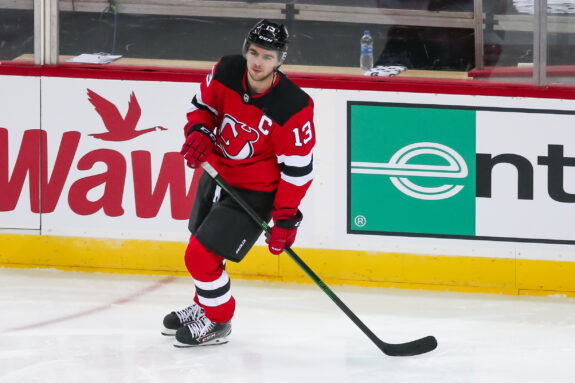
If the Devils are to compete at the level they desire, they should look to the recent runs of the Pittsburgh Penguins and Chicago Blackhawks as models. Like those teams, the Devils assembled a core group that can play together and vie for multiple Stanley Cups. To achieve that end, Fitzgerald must take a page from the recent success of the Vegas Golden Knights and Tampa Bay Lightning and treat each season as if it is the one where they need to win the Cup. Nothing is ever guaranteed, and one never knows when a playoff bracket will suddenly open up or devastating injuries or bad luck will end a season. The potential for catastrophe is why a team goes all in when it can, while organizations who are willing to wait for next year seem to wait while next year never comes as expected.
This is not to say that Fitzgerald cannot afford to be patient. His ability to know when to pull the trigger on trades and contracts has served him well. His patience with Jesper Bratt forced the player’s hand and resulted in a team-friendly eight-year deal. Similarly, Fitzgerald knew when to lock up Hughes long-term, signing the then-20-year-old to an eight-year deal that may end up the most team-friendly contract in the NHL by the time it expires.
“The standard has been set, expectations have been set. And now it’s go time. Are we going to be 112 Point team again? Well, that’s pretty hard to do. Our goal is to play the best hockey we possibly can play for 82 games, get in the playoffs and then push to a cup like everybody else. As we continue to mature as a group. As we continue to potentially add to the group. The most important thing is watching the core grow, develop.”
Tom Fitzgerald, June 16, 2023
Fitzgerald has demonstrated an unwillingness to mortgage the future for the present. However, should there be a close call this summer, Fitzgerald would be wise to opt for the present as his team is ready to go all in.
Can the Devils Win the Stanley Cup With Vanecek & Schmid?
Since the retirement of Hall of Fame goaltender Martin Brodeur, the Devils have struggled to find even consistent league-average goaltending. In the 2021-22 season, the Devils used seven different netminders, leading Fitzgerald to identify fixing the goaltending problem as one of his top offseason priorities. He quickly addressed the need and acquired Vitek Vanecek from the Washington Capitals during the NHL Draft.
Prior to arriving in New Jersey, Vanecek had split time with Ilya Samsonov in Washington, playing 37 regular-season games in his first season and 42 in his second. The Devils expected him to compete with Mackenzie Blackwood and Jonathan Bernier for the starting job and form a tandem until one of the goalies was able to wrest control of the crease. Vanecek got off to a hot start, and both Blackwood and Bernier suffered injuries, effectively abdicating the crease to Vanecek, who was backed up by rookie Akira Schmid.
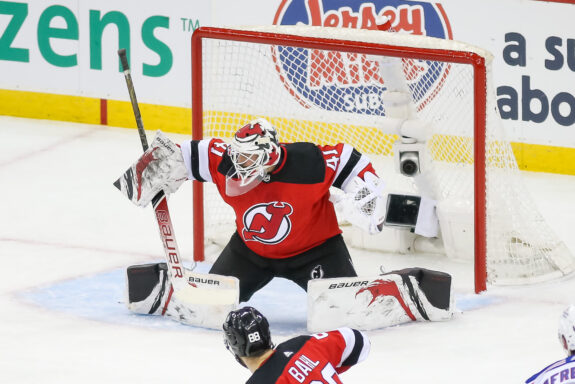
Due largely to both the injuries to Blackwood, combined with Vanecek’s stellar play, the Devils leaned on Vanecek to carry a heavier burden than he ever had in his career. The Devils stretched Vanecek to 52 games, and the wear showed as early as the all-star break. Vanecek went into the break posting a .917 SV% and saved more than 13 goals over expected. In the 11 games following the hiatus, Vanecek posted a .884 SV% and surrendered more than nine goals above expected (per Natural Stat Trick). It was obvious to anyone watching that Vanecek was running out of gas as the energetic, timely, athletic saves were missing from his game.
After some rest, Vanecek was able to finish out the season strong, playing to a .922 SV% and saving four goals above expected in his last nine contests. It appeared the Devils had solved the goaltending issue, especially after Vanecek completed the first 30-win season in Devils history by a goalie not named Brodeur. Things were going so well, head coach Lindy Ruff joked after Vanecek’s 30th victory that the Devils would need to erect a second statue outside the Prudential Center.
The Devils then entered the playoffs with the oft-injured and inconsistent Mackenzie Blackwood (.893 SV%) sidelined to third goalie status in favor of rookie Akira Schmid. Vanecek was the no-doubt starter to open the series against the Rangers. Most were willing to write off Vanecek’s previous playoff struggles as a byproduct of a small sample size combined with a poor defensive team in front of him. As a Washington Capital, Vanecek had played in three playoff games resulting in a disastrous .855 SV% with a 4.25 GAA and allowed four goals above expected, all well below his regular season averages.
The postseason formula for the Devils was simple: get competent goaltending and stay out of the penalty box, as the Devils were dominant in the regular season against the Rangers at five-on-five. The Devils looked to Vanecek to continue the run he had been on, but Vanecek appeared jittery in the first game and never recovered. Schmid refused to concede the crease, shutting out the Rangers twice and outdueling perennial Vezina Trophy candidate Igor Shesterkin over the final five games. Had Schmid not stepped in and posted an incredible .951 SV% and 1.38 GAA with nearly six goals saved above expected, the feeling around the Devils would have been drastically different. In some ways, Schmid’s epic performance covered the woes of Vanecek and took his play out of the spotlight.
Vanecek’s playoff performance into the second round has to be of significant concern to the Devils. In seven appearances, he posted a .825 SV% and 4.64 GAA, allowing a second-worst 7.7 goals above expected (per Money Puck). Most troubling was Vanecek’s inability to regain his confidence. Ruff tried multiple ways to get his goaltender back in form. e pulled him early, used him as a replacement, started him immediately after a poor outing, and gave him games off after he faltered. None of it worked.
It was clear from his comments after Game 4 that Vanecek had lost his confidence. The Devils had seemed to have lost sufficient faith in Vanecek that speculation abounded that Blackwood would be inserted in the crease for Game 5. Schmid ultimately started and played a heroic Game 5, but the Devils’ season ended in overtime without Vanecek or Blackwood seeing the ice.
The question that must keep Fitzgerald up at night is whether he is willing to risk a year of his core’s prime on Vanecek finding a way to exorcise his playoff demons, or in the alternative, that Akira Schmid will still have gas in the tank come April and May after likely doubling his prior workload. In his press conference detailing the Bratt signing, Fitzgerald was quick to mention that Schmid was only two years removed from the USHL. Either or both could have excellent regular seasons next year, but how can the Devils feel comfortable heading into the postseason in the midst of a window of contention with unproven, or worse, inferior goaltending?
While the last two Cup champions showed that you don’t need a top-five goalie, you certainly need one who is durable and can shake off poor performances. In a sense, goaltenders are like relief pitchers in baseball. Rare is the case where one is consistently excellent year after year, and often the team that wins it all does so riding a streaky player who steps his game up in the postseason.
It behooves Fitzgerald to either obtain a bonafide number-one goaltender (Conor Hellebuyck, John Gibson, Juuse Saros) or find a lower-cost player with a track record of success in the playoffs (Antti Raanta). Even if the team believes that Schmid is the eventual starter, a short-term solution with a proven track record is needed to ensure the Devils are set up for success come the 2024 Stanley Cup Playoffs.
Forward Crossroads
The Devils have the luxury of having several young forwards whose play is forcing their way into a lineup where there is little room around the edges of the elite core. There is no way for Fitzgerald to be able to keep all of them, and he will need to choose wisely and turn the rest into assets.
Currently, Jesper Boqvist, Nathan Bastian, Yegor Sharangovich, and Michael McLeod require immediate decisions as the quartet are restricted free agents (RFA). It has been reported that the Devils are fielding offers on Sharangovich, as there are concerns that should he take the team to arbitration that they would not be able to fit him within their salary cap. Sharangovich is coming off a maddeningly inconsistent year where he was unable to take advantage of multiple opportunities to play throughout the lineup. His production dipped, regressing from 46 points in 2021-22 to only 30 in 2022-23, despite playing the same number of games and on a better team.
Sharangovich was also an afterthought in the playoffs, getting scratched in nine of the 12 games. His combination of size and a wicked shot should tantalize a team with cap space looking for a talented player who needs ice time and opportunity to improve. He would likely command draft capital should Fitzgerald look to move his rights.
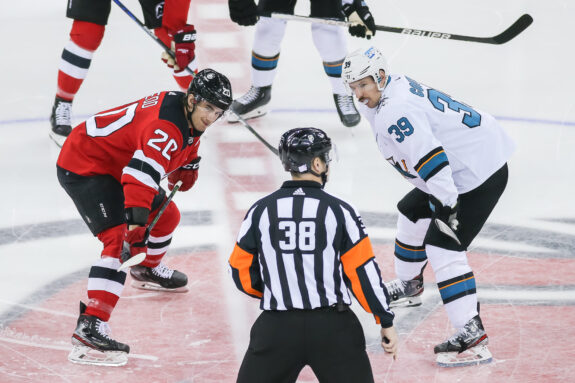
McLeod was the Devils’ best player for much of the playoffs, displaying the speed and tenacity that made him a first-round pick in 2016. He’s also turned himself into one of the premier faceoff takers in the league. There is no doubt that the Devils will qualify him and should look to buy out some of his UFA years at a team-friendly price.
At the projected cost of retaining Bastian, he is another no-brainer. He brought size and grit to a team lacking both attributes in its forward lines. He played much of the season through a debilitating shoulder injury, which cost him power-play minutes as the season progressed, but he was able to contribute on the penalty kill.
The Devils played their best when Ruff could roll four lines, and the chemistry between McLeod and Bastian as two-thirds of the “BMW line” was crucial when the Devils were at their best. Fitzgerald should qualify Bastian and look to extend him for the short term.
Jesper Boqvist played a serviceable role last season. He was able to fill in at center and wing and played on all four lines depending on need. He found a place because of his speed and forechecking ability. Once a top prospect, he’s slid down the Devils’ prospect depth pool and candidly admitted that he needs to show significant improvement to break through in the future. The Devils have not shown any indication that Boqvist is not in their future plans, but his attributes are replaceable, and the team may need his salary to address other issues. The real decision point for Fitzgerald is, can he wait for Boqvist to find his form, or is it time to give the talented AHL forwards an opportunity?
Fortunately, the Devils have a crop of young forwards emerging from their AHL affiliate that will be pushing for playing time. The most prominent of the group is Alexander Holtz. He began last season excelling in the preseason then on the opening night roster with the NHL club but was unable to find a permanent role and ultimately asked to be sent back to the AHL to get playing time. Holtz, a first-round pick in 2020 (7th Overall), possesses an elite shot and is an underrated playmaker, but his footspeed and quickness have concerned the Devils.
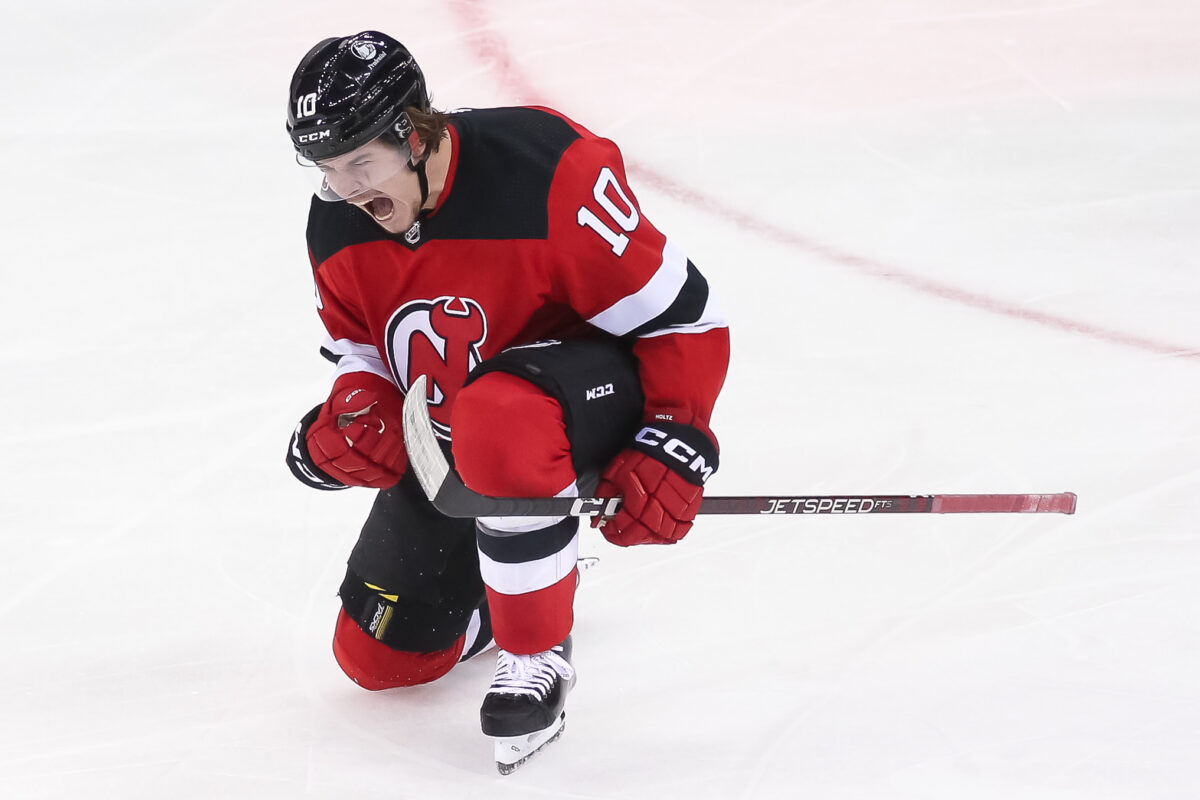
The dilemma is that the Devils’ top-six is very left-hand shot heavy, and the power play is in need of a right-handed sniper. Holtz fits that description perfectly, but is there room for him? With Jesper Bratt, Dawson Mercer, Timo Meier, Ondrej Palat, Jack Hughes, and Nico Hischier, there has to be a concern over whether there is an available top-six role for Holtz, whose game has not translated well to the bottom-six.
Over the past two seasons, he has shown that he has advanced past the competition in the AHL, scoring 62 points in 66 games. There is no doubt that Holtz has significant value throughout the league. If the Devils determine he is not a fit for their system or there is no room for him, they can certainly dangle him to make a big move to improve, whether in goal or during the season as an injury replacement or trade deadline acquisition.
Fitzgerald has been bullish on Nolan Foote throughout the offseason. He name-checked Foote in each of the two press conferences he has given since the Devils’ season ended in Carolina. When asked about making his team heavier, Fitzgerald immediately referenced Foote:
“[y]ou watch the growth of Nolan Foote coming you know, whenever he’s ready, he’s bigger. He’s a bigger stronger player.” Foote plays a heavy game and has the size and shot to complement the way the Devils want to play. He will likely get every opportunity to compete for a spot in the lineup to replace Miles Wood on the fourth line. In limited appearances with the Devils in 2022-23, he did not look out of place and seemed to have improved his skating, speed, and board play.
Fitzgerald will have several options with this group, along with the potential emergence of Tyce Thompson and Graeme Clarke. Thompson is no longer waivers exempt, so the Devils will have to decide whether to move him rather than expose him to waivers should he not be a part of their initial plans.
Clarke is a more difficult case. He came into his own this year, posting 25 goals for Utica and forcing his way into a call-up with the Devils. Like Holtz, Clarke has shown he can dominate the AHL and will push for a spot in the NHL. Also like Holtz, is he the elusive right-hand shot winger that the Devils desperately need? It would surprise nobody to see one of the final roster spots come down to Holtz vs. Clarke. How Fitzgerald manages that situation and whether he chooses to move one or the other will certainly be a topic of conversation throughout the organizational meetings.
Edge Work
Fitzgerald spoke about how with his core largely signed, he could now focus on filling in the edges. While there is certainly a wealth of skill within the system, he should look to free agency or trades to bring in experience and talent to complement his young core. Last season, Fitzgerald’s mantra was making his team tougher to play against by adding grit, and he did so with the additions of Palat, Erik Haula, and Brendan Smith, all veterans with significant playoff experience and known for their toughness. This season, with much of the future in place, Fitzgerald will need to tinker just around the edges.
“What I’m trying to do is create depth. Create an understanding with our top players, how we can be better as an organization. I think probably the biggest reason the Vegas Golden Knights won the Stanley Cup is because they probably have the best depth in the league. And that’s our goal is to build on our depth.”
Tom Fitzgerald, June 16, 2023
While the current crop of UFAs is not considered to be as talented as last season, there are still options that could fit with the Devils’ style of play and within their cost structure. If Tomas Tatar leaves via free agency, there should be a $4-5 million slot available for a UFA. Free agents Jason Zucker, Vladimir Tarasenko, and Ivan Barbashev are veterans with rings who would improve the team at a controlled cost and could be an upgrade over Tatar, who did not play up to expectations in the playoffs. The Devils would benefit from bringing in a versatile, experienced winger to grow the leadership group.
The Devils will also likely have to replace winger Miles Wood, who is likely to depart as a UFA. Wood, coming off major hip surgery, played inconsistently throughout the 22-23 season, and his penchant for offensive zone penalties resulted in him being a healthy scratch in crucial playoff games. It is likely both sides desire a new start. While Foote or Curtis Lazar could reasonably fill this role, Fitzgerald should not shy away from trying to upgrade the position with a player like Jesper Fast.
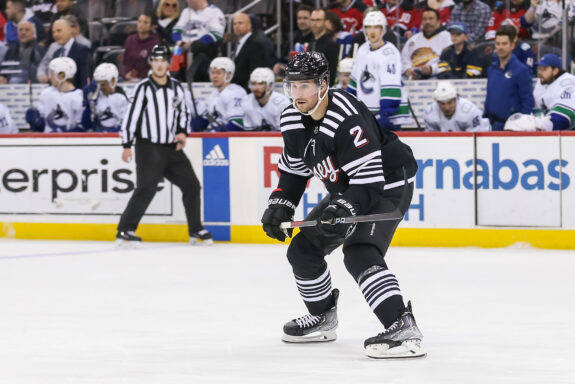
The depth of the defense corps should permit more patience from Fitzgerald, as he has a wealth of options from within the system as well as his top four locked up for just over $16 million. The Devils are likely to start with Dougie Hamilton, Jonas Siegenthaler, Luke Hughes, John Marino, and Kevin Bahl as the top five and then choose between veteran Brendan Smith, rookie Simon Nemec and Reilly Walsh for the final two spots.
Fitzgerald can afford to be patient, as Smith’s versatility will allow him to fill in throughout the lineup, and the emergence of Bahl as a lockdown defender able to use his length and size to kill plays makes the need to go outside the organization unnecessary. It would not be a surprise to see the Devils add depth defensemen on tryout contracts for training camp, but there is no need for them to spend cap dollars adding around the edges on defense.
Fitzgerald should prioritize finding players who can provide depth, versatility, speed, and playoff experience. The Devils will certainly have a more difficult time replicating their 22-23 success, as they will be playing with a target squarely on their back rather than sneaking up on teams. The Devils enter the season with the fourth-best odds to lift the Stanley Cup at the end of next season. With the belief spreading throughout the league that the Devils are legitimate, it is incumbent upon Fitzgerald to choose wisely and find ways to add without sacrificing his important future pieces. Fortunately for Devils fans, he has been a master of that, whether it was the trade for John Marino or the acquisition of Timo Meier, each time Fitzgerald has objectively gotten the better of the deal while retaining his major assets.
